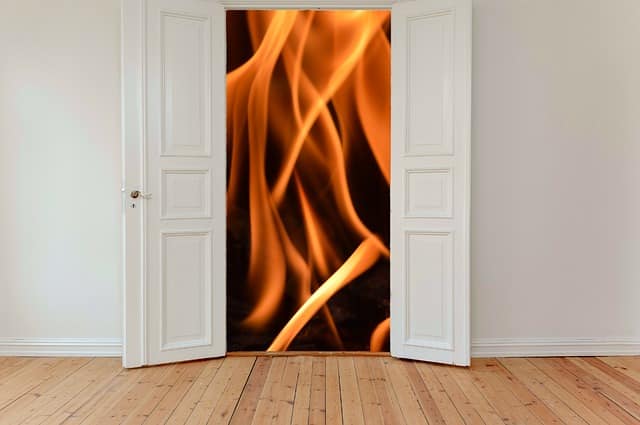Do You Have a Fireproof Home?
Have you taken the steps to fireproof your home?
People build homes to keep them safe from outside dangers. However, when purchasing a home, oftentimes people don’t think about events that are uncommon. However, according to the National Fire Protection Association, an estimated 374,000 U.S. homes catch fire annually.
Although homes aren’t fireproof, there are certainly ways that homes and lives can be better protected & hold up longer in the event of a fire.
Here is everything that you can do to help make sure your home is fire-safe!
RELATED: HOME INSURANCE IN FLORIDA: WHAT YOU NEED TO KNOW
Smoke Detector Alarms
While this may seem like an obvious thing, many homes either have smoke detectors that are too old or are missing entirely.
There are many cases each year where a house fire started and the home didn’t have working smoke detector alarms in it. This allows the fire to have more time to develop and spread than it should have. This often results in a great tragedy such as substantial or total loss of property and a higher number of injuries and/or death to both persons and pets. The biggest takeaway is that many of these scenarios are avoidable with properly maintained and functioning smoke alarms for early warning.
A fireproof home should have at least one smoke detector alarm on every house level, especially by bedrooms (within 10-feet of the door, at least). It’s not a bad idea to have one installed in the garage, and if also in the basement (if you have one in Central Florida, that is). However, you may be surprised that most professionals do NOT recommend placing one in the kitchen, to prevent false alarms. There you have it!
You should be testing your smoke detectors at least once a month and replacing batteries as frequently as necessary. The expected serviceable life of a smoke detector alarm is up to 10-years according to both InterNACHI, and the NFPA (National Fire Protection Association). That’s from the date of manufacture, not the date of installation, by the way. If yours are older, then they should be replaced. If they are hardwired (i.e. interconnected), then a licensed electrician should handle this task since you’re dealing with 110-120V electricity that can be dangerous to non-professionals. However, if they are not hardwired, a 10-year sealed-battery type is suggested, which you can install yourself.
RELATED: SUMMER HOME MAINTENANCE TIPS
It’s easy to get overwhelmed when shopping for smoke detector alarms, and we can’t blame you. There are so many options, such as ionization, photoelectric, contractor packs, etc.
What does all of this even mean?
For starters, just having a functioning smoke alarm is better than none, so keep it in perspective. Ideally, if you can afford an alarm that uses both ionization and photoelectric technologies, then that is preferred. Ionization tends to be more responsive to detecting actual flames, while photoelectric is more sensitive to smoke from smoldering type fires.
Here’s a terrific public education article from the NFPA that explains this in greater detail – Ionization vs photoelectric smoke alarms.
Electrical
Electrical fires happen all the time – but they can be prevented with the right precautions.
Make sure that you don’t have any electrical wires that are frayed, cords that are splitting, or cords that are showing exposed wires. Regularly check the electrical box to make sure that it isn’t overheating from a power overload. If you don’t know what you are doing with electrical, then just don’t do it at all and hire a professional.
If you aren’t sure if your electrical box is in good condition, you could get a home inspection to make sure that everything is working properly and the system isn’t being overloaded.
RELATED: FLORIDA HOME MAINTENANCE CHECKLIST
Fireproof Home Materials
Older homes that haven’t been updated are one of the biggest hazards, because they may have not been built with fire-resistant building materials and design.
There are many new materials that have been developed to protect homes from catching on fire quickly. For instance, fire-stopping at the top plate of framed walls has been required for some time. This is to prevent fires from reaching the attic, where it can quickly spread to other parts of the home. You should find out what your home has been built with & make sure that the proper materials and techniques have been used.
In addition, you can install double-pane windows (which will be helpful for insulating your home as well) and have a new roof installed that has fire-resistant materials such as newer asphalt shingles, tile, clay, metal, or slate roofs.
You may not be aware that many house fires actually start in the garage. For this reason, fire-separation is required between this space and the living area when you have an attached garage. This typically entails full drywall (at least 1/2″) covering the walls and ceilings, and a 1-3/8″ solid-core wood or other approved occupant door into the home. We see this missing all the time, especially in homes built before the mid-1970s. Also, while we love our furry friends and want to spoil them, pet doors should absolutely not be installed at the occupant door into the garage, as it will defeat this required fire separation. Here’s more on this topic from InterNACHI.
Take Extra Precautions To Fireproof Your Home
In the event of a fire, you will want to have a plan of escape and materials to help keep you safe. Although not required in all areas and municipalities, it’s a good idea to have multiple fire extinguishers in easily accessible places; particularly in garages, utility/laundry rooms, and the kitchen where fires are more likely to occur.
Create a safety kit with a fire-proof blanket, first aid supplies, and extra tools. It is also recommended to make an escape plan. Go over this plan with your family and practice it.
While fires aren’t always preventable (such as wildfires) you can take these precautions and do everything you can to build a fireproof home in case of an emergency!
NEXT: RELATED: ARE HOME INSPECTIONS WORTH THE COST?






